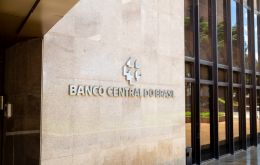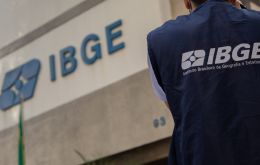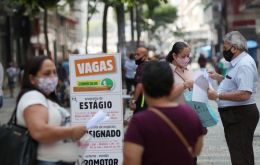MercoPress. South Atlantic News Agency
Tag: IBGE
-
Wednesday, September 17th 2025 - 10:45 UTC
Sharp fall in unemployment reported in Brazil

A report released Tuesday by Brazil's Institute of Geography and Statistics (IBGE) showed a significant drop in the unemployment rate in the quarter ending in July, which stood at 5.6%, the lowest since records began in 2012. In the previous rolling quarter, the rate was 5.8%.
-
Monday, September 1st 2025 - 09:58 UTC
Brazil’s richest earning faster

A study by the research group FiscalData last week found that Brazil's 0.1% richest people (about 160,000 individuals) increased their earnings fivefold faster than average Brazilians between 2017 and 2023. This group's income rose 6.9% against the 1.4% national average. Hence, they went from holding 9.1% of the country's income in 2017 to 12.5% in 2023, the survey found.
-
Monday, March 31st 2025 - 10:35 UTC
Formal employment up in Brazil last month

The Brazilian Government of President Luiz Inácio Lula da Silva recorded a positive balance of 431,995 formal jobs in February 2025, marking the highest monthly figure in the Labor Ministry's New General Register of Employed and Unemployed (New Caged) series since it began in 2020.
-
Saturday, February 8th 2025 - 09:46 UTC
Brazil’s industry posts 3.1% output increase in 2024

According to a report released by Brazil's Institute of Geography and Statistics (IBGE) this week, South America's largest country's industrial production closed out 2024 with a 3.1% from 2023's figures. These results, driven by rising employment and income, were the third-highest annually in the last 15 years.
-
Wednesday, December 11th 2024 - 10:46 UTC
Brazil's inflation slows down, IBGE announces

The Broad National Consumer Price Index (IPCA) in South America's largest country stood at 0.39% in November, according to the Institute of Geography and Statistics (IBGE) survey released Tuesday, Agencia Brasil reported. The new figures represented a slowdown from October's 0.56%, which “does not indicate a drop in prices but rather a slower pace of increases” as food items kept driving the IPCA upwards.
-
Saturday, November 30th 2024 - 10:39 UTC
Sharp fall in unemployment in Brazil

According to the latest issue of Brazil's Institute of Geography and Statistics (IBGE) Household Sample Survey, unemployment stood at 6.2% in the quarter ending last month, Agencia Brasil reported. It was the lowest mark since the measurement began being tracked in 2012. The previous quarter, ending in July, had a rate of 6.8%, while in the same quarter last year, ending in October, the rate stood at 7.6%.
-
Tuesday, June 25th 2024 - 09:41 UTC
Brazil's yearly inflation projection adjusted slightly upwards

Brazil's Central Bank (BCB) Monday released the latest edition of its Focus Bulletin showing a slight upward adjustment in the Broad National Consumer Price Index (IPCA) from 3.96% to 3.98% this year, Agencia Brasil reported. The index is considered the country's official inflation. The weekly survey among leading financial institutions also projected an increase from 3.8% to 3.85% next year while for 2026 and 2027 the forecasts were 3.6% and 3.5% respectively.
-
Saturday, March 2nd 2024 - 10:50 UTC
Brazil: IBGE announces economy grows 2.9% in 2023

According to a report released Friday by Brazil’s Institute of Geography and Statistics (IBGE), the gross domestic product (GDP) in South America's largest country grew by 2.9% in 2023 driven by a record 15.1% expansion in the agricultural sector. It was the most significant leap since the beginning of the series in 1995. Industry (1.6%) and services (2.4%) also saw an improvement.
-
Friday, February 9th 2024 - 10:47 UTC
Brazil's CPI 0.42% up last month

According to Brazil's IBGE statistics bureau, inflation last month in South America's largest country reached 0.42% for an accumulated 4.51% year-on-year. These results were driven mainly by increases in the prices of food, Agencia Brasil explained. January's figures were lower than the 0.56% recorded by the Broad National Consumer Price Index (IPCA) in December.
-
Thursday, November 17th 2022 - 19:09 UTC
Unemployment drops in Brazil

According to the Quarterly Continuous National Household Sample Survey (PNAD) released Thursday by Brazil's Institute of Geography and Statistics (IBGE), the unemployment rate in the third quarter of this year went down from 9.3% to 8.7% overall from the previous quarter, thanks to drops in six states: Paraná (-0.8 %), Minas Gerais (-0.9 %), Maranhão (-1.1%), Acre (-1.8%), Ceará (-1.8%) and Rondônia (-1.9%).
